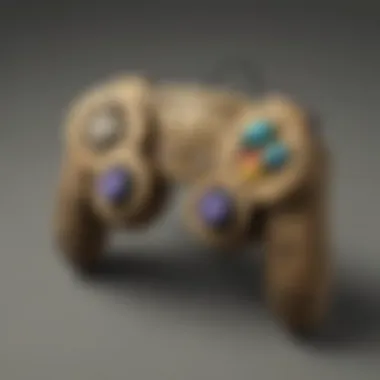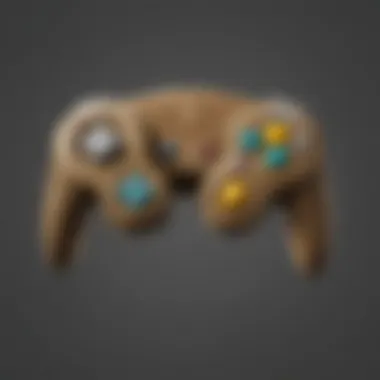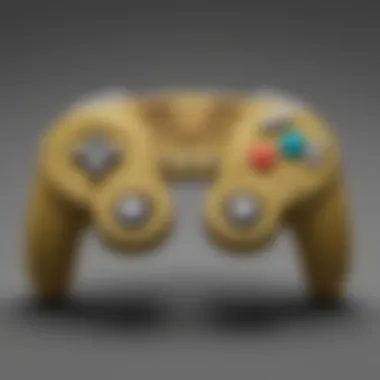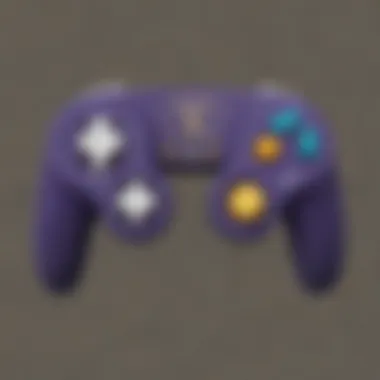Unveiling the Intricacies of GameCube Controllers: An In-Depth Guide


Game Reviews
GameCube controllers have revolutionized the gaming experience, offering a blend of ergonomic design and cutting-edge features that set them apart in the gaming peripherals market. From their distinctive button layout to their precise analog sticks, these controllers have become synonymous with a responsive and immersive gameplay experience. The compatibility of GameCube controllers with a wide range of games across various platforms has solidified their position as iconic gaming accessories, redefining the way players interact with their favorite titles.
- Impact of GameCube Controller Design and Features
- Compatibility with Different Gaming Platforms
- Integration of Unique Gameplay Mechanics
Character Analyses
As the gaming landscape evolves, characters within the Zelda universe have played a pivotal role in shaping player experiences and narratives. From protagonists like Link and Zelda to villains such as Ganondorf, each character contributes a layer of depth and complexity to the rich lore of the franchise. Delving into their individual backstories, motivations, and relationships unveils a tapestry of storytelling that has captivated generations of players. Fan theories and speculations further enhance the mystique surrounding these beloved characters, sparking discussions and interpretations that add new dimensions to their already intricate personas.
- Analysis of Key Characters in the Zelda Universe
- Exploration of Character Development and Arcs
- Engaging with Fan Theories and Speculations
Lore Discussions
The realm of Zelda is not just a collection of games but a vibrant tapestry of mythology, worldbuilding, and intriguing lore that spans across generations. Seal legends, mythical creatures, and enigmatic artifacts populate this fantastical universe, offering players a glimpse into a rich and immersive mythos. Unraveling the connections between in-game elements and real-world mythologies unveils an extra layer of depth and intrigue, highlighting the meticulous attention to detail and storytelling prowess of the creators. The placement of events within the timeline and the accompanying theories further deepen the lore, inviting players to immerse themselves in a narrative that transcends traditional gameplay.
- Exploration of Zelda Mythology and Worldbuilding
- Unveiling Legendary Items and Intriguing Artifacts
- Linking In-game Elements to Real-world Mythologies
- Discussion on Timeline Placement and Theories
Gameplay Strategies
Mastering the gameplay mechanics of Zelda games goes beyond mere button presses and joystick movements; it requires strategic thinking, problem-solving skills, and a keen eye for detail. Combat techniques, puzzle solutions, collectibles, and boss battle strategies form the cornerstone of successful gameplay, offering players a roadmap to navigate the challenges that await them. From leveraging specific tools and abilities to uncovering hidden secrets and overcoming formidable foes, the strategic depth of gameplay in Zelda titles ensures a rewarding and immersive experience for players of all skill levels.
- Strategies for Combat, Puzzles, and Collectibles
- In-depth Analysis of Boss Battle Tactics
- Tips and Tricks for Navigating Challenges and Overcoming Obstacles
Introduction to GameCube Controllers
The entry point into the world of GameCube controllers sets the foundation for understanding the nuances of these iconic gaming peripherals. Capturing the essence of user interface evolution in gaming consoles, this section delves deep into the design elements and functional aspects that define the GameCube controllers' significance. Exploring the ergonomic considerations, button layout precision, and the overall user experience, this segment serves as a gateway to comprehending the role GameCube controllers play in enhancing gameplay.
Evolution of GameCube Controllers
Origins of GameCube Controllers


Unraveling the origins of GameCube controllers illuminates the path of innovation that Nintendo embarked upon. From the pioneering days of analog control to the ergonomic advancements introduced, the origins signify a paradigm shift in how gamers interact with gaming environments. The distinctive features of the initial GameCube controllers laid the groundwork for subsequent iterations, offering a blend of precision and comfort that altered the gaming landscape.
Design Innovations Over Time
The evolution of GameCube controllers unfolds a tapestry of design innovations that have redefined user interaction in gaming. Each iteration builds upon its predecessor, refining button layouts, enhancing grip comfort, and integrating advanced functionalities that cater to the evolving gaming demographics. From wireless capabilities to motion control integration, the design innovations over time showcase a relentless pursuit of excellence in user experience and gameplay immersion.
Significance in Gaming History
Impact on Gaming Industry
The impact of GameCube controllers on the gaming industry resonates with their ability to set new standards in gameplay precision and immersive engagement. Revolutionizing player control dynamics and introducing innovative features, GameCube controllers influenced gaming console design paradigms and player expectations. Despite certain limitations, the impact on the gaming industry remains a testament to Nintendo's commitment to pushing boundaries and reshaping interactive entertainment.
Legacy in Competitive Gaming
The legacy of GameCube controllers in competitive gaming transcends mere gameplay accessories to becoming instruments of competitive prowess. Favored by professional gamers for their responsive button feedback, ergonomic design, and customizable configurations, GameCube controllers have etched a lasting legacy in the competitive gaming arena. Despite the influx of modern peripherals, the enduring appeal of GameCube controllers in competitive gaming underscores their timeless relevance and competitive edge.
Design and Ergonomics
In this comprehensive guide on GameCube controllers, the section highlighting Design and Ergonomics serves as a crucial focal point. Understanding the intricacies of controller design is paramount for gamers seeking optimal performance and comfort. The ergonomic considerations play a pivotal role in enhancing the overall gaming experience. The placement of buttons, the shape of the controller, and the materials used in construction all contribute to the design's effectiveness. By delving into the ergonomics of GameCube controllers, players can appreciate the thought and precision that go into creating a device that not only functions flawlessly but also feels comfortable during extended gaming sessions.
Button Layout and Functionality
A Button
The A Button on GameCube controllers is a fundamental element that epitomizes simplicity and responsiveness. Its position and prominence make it a go-to option for crucial in-game actions. The distinctive tactile feedback and optimal placement of the A Button ensure quick and effective inputs, essential for competitive gameplay. However, some players may find its size slightly smaller than ideal, impacting comfort during prolonged gaming sessions.
B Button
Complementing the A Button, the B Button offers versatility in gameplay mechanics. Its larger size compared to the A Button caters to different gaming preferences and playstyles. The B Button's responsiveness and distinct placement contribute to its popularity among players who prioritize precision and control in their gaming experience. Despite its advantages, some users may perceive the B Button's placement as slightly offset, requiring adjustment for seamless performance.
and Y Buttons


The X and Y Buttons introduce diversity in control schemes, allowing players to customize input methods for various game genres. Their strategic positioning enhances accessibility during intense gaming moments, facilitating quick and intuitive responses. The X and Y Buttons' symmetric layout accommodates different hand sizes, promoting comfort across a wide range of users. However, some individuals may find the buttons' proximity challenging, necessitating practice to master efficient utilization.
C-Stick, D-Pad, and Triggers
The C-Stick, D-Pad, and Triggers expand the controller's functionality, offering nuanced control options for intricate gameplay mechanics. The C-Stick's compact design enables precise analog inputs, vital for executing complex maneuvers in diverse game genres. The D-Pad's tactile feedback enhances menu navigation and directional inputs, adding versatility to the controller's capabilities. Additionally, the triggers' analog sensitivity provides responsive input for actions requiring variable speeds or pressure. Despite their advantages, some players may struggle with the triggers' travel distance, impacting their comfort and reaction time.
Controller Grip and Comfort
Handle Design
The handle design of GameCube controllers emphasizes ergonomics to ensure a comfortable and secure grip during gameplay. The contoured shape and textured surface of the handles offer enhanced control and stability, crucial for extended gaming sessions. The handle's curvature conforms to the natural shape of the hand, reducing fatigue and improving overall comfort. However, users with larger hands may find the compact size of the handles restricting, requiring adjustments to accommodate different grip styles.
Ergonomic Considerations
Ergonomics considerations in GameCube controllers focus on mitigating strain and discomfort associated with prolonged use. The controller's weight distribution, button placement, and grip ergonomics aim to reduce hand fatigue and promote natural hand positioning. The ergonomic design prioritizes user comfort and performance, emphasizing the significance of ergonomics in gaming peripherals. Nevertheless, individual differences in hand size and grip preferences may influence the controller's ergonomics, requiring players to personalize their grip for optimal comfort and control.
Features and Compatibility
In this section of the comprehensive guide, we delve into the crucial aspects of the Features and Compatibility of GameCube controllers. Understanding the nuances of these elements is paramount for gamers looking to elevate their gaming experience. Features such as button responsiveness, ergonomic design, and compatibility with different platforms play a pivotal role in the controller's performance. Acknowledging the compatibility of the controller with various gaming consoles enhances its versatility, making it a favorable choice among gamers seeking a seamless transition between gaming platforms.
Wireless vs Wired Options
Advantages and Disadvantages
The discussion on Wireless vs Wired Options is essential in determining the controller's connectivity and user experience. Wireless controllers offer freedom of movement and eliminate the constraints of cords, providing a clutter-free gaming environment. However, wired controllers have lower latency, ensuring faster response times crucial for competitive gaming scenarios. Analyzing the pros and cons of each option allows gamers to make an informed decision based on their gaming preferences and playing styles, thus optimizing their overall gaming experience.
Suitability for Different Games
Exploring the suitability of various controllers for different games sheds light on the importance of choosing the right controller for specific gaming genres. While wireless controllers offer convenience and mobility suitable for casual gaming sessions, wired controllers excel in games that demand precise movements and quick reflexes. Understanding the compatibility of controllers with different game types empowers gamers to select the most appropriate controller, enhancing their gameplay performance and enjoyment.
Compatibility with Various Platforms


Nintendo Switch
Delving into the compatibility of GameCube controllers with the Nintendo Switch platform opens up a new realm of gaming possibilities. The seamless integration of GameCube controllers with the Nintendo Switch console enhances gameplay immersion and nostalgia for players familiar with the controller's iconic design. Recognizing the unique features and limitations of using GameCube controllers with the Nintendo Switch platform enables gamers to make the most of their gaming experience, bridging the gap between classic and modern gaming dynamics.
PC and Emulators
Exploring the compatibility of GameCube controllers with PCs and emulators offers gamers a versatile gaming experience beyond traditional consoles. The adaptability of GameCube controllers to PC gaming setups and emulator platforms broadens the scope of gaming options, providing gamers with flexibility and customization opportunities. Leveraging the unique features of GameCube controllers in PC gaming environments enhances the gaming experience, blending classic controller design with modern gaming technologies.
Using Adapters
Understanding the functionality of adapters in connecting GameCube controllers to various platforms is essential for optimizing compatibility and expanding gaming possibilities. Adapters serve as bridges between the controller and different gaming devices, enabling seamless connectivity and controller recognition. Exploring the advantages and disadvantages of using adapters allows gamers to overcome compatibility barriers, unlocking new gaming experiences and possibilities across multiple platforms.
Usage and Tips
In the realm of GameCube controllers, the section on Usage and Tips stands as a pivotal component, offering enthusiasts and players a wealth of knowledge on maximizing their gaming experience. Understanding the nuances of utilizing these controllers efficiently can greatly impact gameplay outcomes. This section delves into crucial elements such as customizing button configurations and adjusting sensitivity, both key factors in optimizing the controller to suit individual preferences.
Optimizing Controller Settings
Customizing Button Configurations
Delving into the customization of button configurations unveils a world of personalization tailored to meet the unique demands of players. By allowing users to assign specific functions to different buttons, this feature enhances gameplay fluidity and responsiveness. The strategic placement of commands can significantly improve in-game performance, catering to various play styles and preferences. Additionally, the flexibility offered by customizing button configurations caters to diverse gaming genres, ensuring a seamless integration of controls for a dynamic gaming experience.
Adjusting Sensitivity
The meticulous adjustment of sensitivity settings plays a crucial role in fine-tuning the controller to align with individual playing styles. By modifying sensitivity levels, players can achieve precise control over in-game actions, facilitating quick movements and accurate maneuvers. This feature allows for enhanced responsiveness, crucial in fast-paced gaming scenarios where split-second decisions can determine victory or defeat. However, while heightened sensitivity offers increased precision, it may require adaptation periods for players transitioning to more responsive controls.
Maintenance and Care
The aspect of Maintenance and Care underscores the importance of preserving the longevity and performance of GameCube controllers. These durable peripherals require proper upkeep to ensure sustained functionality and optimal gaming experiences. This section emphasizes essential practices such as adhering to cleaning instructions and implementing preventive measures to safeguard controllers against wear and tear.
Cleaning Instructions
Appropriate cleaning procedures are imperative in maintaining the pristine condition of GameCube controllers. Detailed cleaning instructions highlight the significance of regular maintenance to prevent debris buildup and ensure smooth operation of buttons and triggers. By following recommended cleaning techniques, players can prolong the lifespan of their controllers and sustain peak performance during gameplay sessions.
Preventive Measures
Implementing preventive measures acts as a preemptive strategy in preserving the integrity of GameCube controllers. By proactively addressing potential issues and applying protective measures, players can mitigate the risk of controller malfunctions and structural damage. Emphasizing careful handling and storage practices, alongside routine maintenance, enhances the overall durability and reliability of these cherished gaming accessories.







